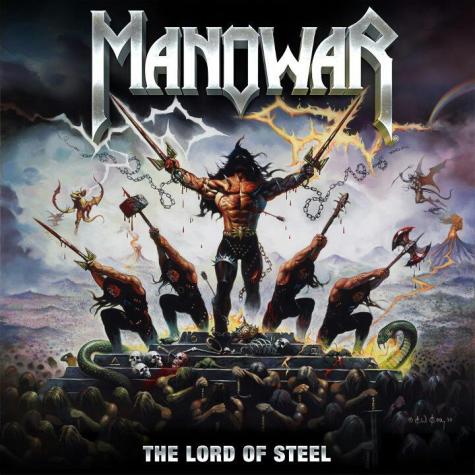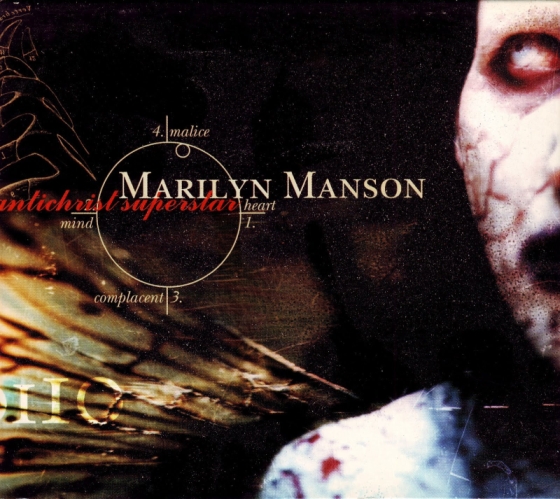 Magic Eye images show you one image at a casual glance, and another image if you focus on them at length. Manowar is the Magic Eye of metal. Their official image is of a goofy retro metal band that take themselves too seriously. But study the band at length and the facade cracks, and you see the disturbing truth, the band is the personal bondage gimp of bassist Joey DeMaio.
Magic Eye images show you one image at a casual glance, and another image if you focus on them at length. Manowar is the Magic Eye of metal. Their official image is of a goofy retro metal band that take themselves too seriously. But study the band at length and the facade cracks, and you see the disturbing truth, the band is the personal bondage gimp of bassist Joey DeMaio.
In the 90s, drummer Scott Columbus took a nearly 6 year hiatus from the band, with Joey DeMaio making a statement that Scott had to care for his sick son. In retrospect, this seems to have been a cover story, maybe because DeMaio thought that the revelation of internal stife could hurt the band’s image (“Brothers of Metal” etc). Columbus passed away in 2011, leaving behind an interview titled Why I Left Manowar. “My son was never sick. […] deduce from that what you may.”
In 2002 DeMaio launched Magic Circle Music, a label for “true metal” artists. Rhapsody of Fire released two albums on the label, and then the partnership went down in a snarl of legal tangles (they even called out DeMaio by name in a Myspace blog). Labelmate Holyhell seems to be in about the same place (Recent quote from their frontwoman’s Facebook: “every storm runs out of rain….and every demon runs out of fire…….I will not give up on HolyHell, nor lose my smile in this dark mess.”)
Another storied Magic Circle Music release was a Ronnie James Dio “tribute” album rushed out to market less than a month after the legendary vocalist died. Manowar covered “Heaven and Hell” for the album, and DeMaio did a number of interviews where he talked about the friendship he and Dio had shared. Wendy Dio soon released a statement saying that although DeMaio and Dio had met, they were not friends.
And then there’s Manowar’s music itself. The band appears to be barely functioning, playing a handful of tour dates a year and releasing tepid albums with the irregularity and discomfort of a cat gagging up a furball. DeMaio patches up the gaps with an Iron Maiden-esque plethora of live albums, concert DVDs, re-releases, and re-recordings. 2007 saw the launch of The Asgard Saga, purportedly a Manowar-based multimedia franchise containing games, movies, and books. Six years later and the project is deader than disco. DeMaio promised a new album in 2010 called Hammer of the Gods…and then made a video announcing he had thrown the album out and was starting again. Nothing DeMaio says can be relied upon, he makes promises out of one side of his mouth while saying “oops” out of the other.
I go on this lengthy spiel only to illustrate why the band seems curiously depleted from its heyday in the 80s. Manowar barely is a band anymore! It’s just a DeMaio doing everything, with a few glorified backup musicians that he has the nerve to call bandmates. Brothers of metal will always be there, standing together with hands in the air..
When I listened to The Lord of Steel (the latest in Manowar’s backbreaking two-albums-per-decade schedule), a few things stood out.
1. The production is very bad.
2. There’s less orchestra and more actual metal
3. The lyrics are very bad.
4. The songs are catchy and bombastic, however
5. The soul of old-school Manowar is not present
1. DeMaio promised that the bass on this album would be super-heavy, and that turned out the same as many of his promises. The early “Hammer Edition” release of LOTR contains the most abusive and awful bass sound I can recall hearing on a professionally recorded metal album, an over-distorted “bzzz-bzzz-bzzz” sound that sounds like bees pinging around inside a sewer pipe. The later “Steel Edition” smooths out the bass a bit, but it’s still muddy as fuck and sits uncomfortably in the mix. The album in general has a “digital” sound that I’m not partial too, with the drums sounding obviously quantized in places.
2. The orchestration is greatly scaled back from past albums, and replaced with guitars and whatnot. It’s hard to assess whether this is a positive change. No question: Warriors of the World and Gods of War went far overboard, but they had a grandiosity that’s missing here. Maybe it’s not an issue of what they took out, but what they added in. I wish LOS had more raging fast songs like “God or Man”. The whole album seems slow.
3. The lyrics hit a new low. You may be thinking that this band always had bad lyrics, but no, they had enthusiastic bad lyrics. “May your sword stay wet like a young girl in her prime” made me cringe, but it also made me smile. This has lazy, don’t-give-a-shit bad lyrics. “For the glory of battle I will fight until I die / Live one day as an eagle or a lifetime as a fly!” “Never gonna change our style / Gonna play tonight for quite a while!” “I get professional pay / To make people go away!” A Dr Seuss exercise in grabbing whatever word will rhyme, in other words (I wish there were other words).
4. However, the songs are actually pretty good. The title track is as powerful as a charging bull, and “Touch the Sky” is extremely catchy and memorable. “Black List” is a six and a half minute trudge through, reminding of Sabbath-inspired crushers from the old days such as “The Demon’s Whip”. The Steel Edition of the album features a fascinating epic ballad titled “The Kingdom of Steel”, which features DeMaio playing classically-inspired melodies on a piccolo bass.
5. Yet Manowar still fails to recapture the glory they had on their early releases. Old Manowar had something beyond catchy songs and annoying bass tracks. They had a heart. Even when DeMaio was being his usual self (10 minute long bass solos and what have you), there was an irresistible charm to the music that caused it to transcend its own stupidity.
Concerning though it is that DeMaio might be choking the life out of this band, there’s a more disturbing option: that the band by rights should have died years ago, and DeMaio has it hooked up on life support. He does nearly everything. He writes the songs, writes the lyrics, does the production, does 95% of the marketing (when was the last time you saw a Manowar member except DeMaio give an interview?), and so on.
Maybe I was wrong to call Manowar a Magic Eye. They’re more like a Joey DeMaio Mandelbrot set. No matter how deep you go, it’s just DeMaio DeMaio DeMaio, all day and every day. Manowar isn’t a band of true metal brothers. It’s a dead horse being kept alive by the most out of control egomaniac in rock and roll.
No Comments »
 Hype means you’ll be forgotten tomorrow.
Hype means you’ll be forgotten tomorrow.
I remember when Guitar Hero games were ubiquitous and inescapable. Game stores seemed built out of Guitar Hero boxes. Then, for no perceptible reason, people stopped playing them, people stopped buying them, and game companies stopped making them. The franchise imploded like a bubble in the Marianas Trench. Three years later, it’s actually getting hard to believe that Guitar Hero games even once existed. Gone…all of it gone…
Marilyn Manson was huge in the mid 90s, and a national tragedy made him huger. But there was always this deadness at the centre of the Manson hype. He clearly wouldn’t be around for long. Nobody cared much about what he actually said or did, and certainly nobody cared about his music, people only cared about his image — the evil satanist rockstar, and his image that often forks away from the truth (Manson’s only involvement in the Church of Satan was to accept an honorary priesthood while a guest of Anton LaVey’s.
He also marked an ominous cultural tidal change: the exploitation and monetization of controversy. Amazing, once people thought that getting arrested or sued or libelled in the papers was a bad thing. Now, you milk it for all it’s worth, and guys like Manson showed us the way. Bad press is a like a psychotic millionaire sugar daddy. Some say you should avoid him. But say and do the right things, and you can go on the ride of your life, even while he’s breaking your teeth off at the gumline with his fists.
Between these two points, the music often gets overlooked. At times it seems music is the least important part about this band. Antichrist Superstar is Manson’s most enduring album, but it is flawed. It is as long as NIN’s Broken and Ministry’s ???????? combined, and is inferior to both those releases. The band seems to be too busy chasing heroin around on tinfoil to write good songs consistently. It has many impressive moments, but they don’t flow steadily or reliably.
“Irresponsible Hate Anthem” is noisy punk rock song, in one ear and out the other. “The Beautiful People” is great, it’s catchy and features an instantly recognisable tom-tom beat by Ginger Fish. The whole album has really good instrumentation. The songwriting often gets floppy, but all the parts are played with intensity and conviction. How to make a Marilyn Manson album: pack the rafters with talented musicians, supply drugs, and hang on for dear life.
The album is long as fuck, and full of frustrating Good Cop/Bad Cop songs that entertain and bore in clear-cut, alternating sections. Occasionally there’s a genuinely thrilling idea (the thrashing chorus of “The Reflecting God”, the Black Sabbath riffing on “Kinderfeld”) and then the band drops it like a senile old-timer dropping a TV remote. “Cryptorchid” is a pure waste of space, just a mess of ambient industrial shards.
Manson’s voice is commanding and creepy, although he has some tics that never really sat well with me. His cutesy falsetto is just plain annoying, as is his habit of taking a pithy lyric and shouting it over and over again, as if he’s worried we’ll miss the point (with good reason, as it happened).
Antichrist Superstar is unique and powerful, but it is not quite a classic. It’s strength is mostly in its heraldry: it’s the most shocking, the most outrageous, etc. Musically, Manson never learned the difference between songwriting that articulates fucked-upness and songwriting that’s plain fucked-up.
No Comments »
 It is generally agreed that Marilyn Manson’s phenomenon is more interesting than Marilyn Manson’s music. If you yourself agree, you may want to read this book, which is all phenomenon and zero music.
It is generally agreed that Marilyn Manson’s phenomenon is more interesting than Marilyn Manson’s music. If you yourself agree, you may want to read this book, which is all phenomenon and zero music.
Published in 1998, shortly before the release of Mechanical Animals, it tells the story of a young boy called Brian Warner, who escaped a childhood of decorum and religion, embraced drugs and satanism, and — after a failed writing career — found his true calling in music (to torture a Clive Barker quote, writing is masturbation, while playing in a band is an orgy). Somewhere along the way he has an epiphany: there there were worse things than being rejected by the cool kids. Being accepted by the cool kids, perhaps. Like Antichrist Superstar, this book has three parts, and with the final part documenting the aforementioned album’s creation and the beginnings of nationwide controversy.
I don’t hate Manson, but I don’t pity him, either. Yes, he was subject to many defamatory attacks, and he was blamed for many things that weren’t his fault…but he has profited handsomely from the controversy, too. He sure as fuck didn’t become the most famous rockstar in America because his music was good.
The book was co-written with Neil Strauss, who is a talented writer — relentless at paring away the rind and getting straight to the interesting parts. If Strauss was a DVD player he’d skip over the movie’s opening credits, start you in the middle of the first action scene, and fast forward through all the dialogue at 3x speed. Reading his books can be exhausting because he throws so much stuff at you so quickly.
The book is full of interesting moments — Brian describes his run-ins with police, his meeting with Anton Szander LaVey, and provides some affidavits from the American Family Association that make him sound like the worst monster of the 21st century (I’m sure he appreciates this very much). I wish there had been fewer random groupie sex stories, and more about Trent Reznor. For a while it seems the working relationship between the two men is building to something big, but the expected payoff doesn’t occur.
The book finds time for lots of philosophising. The revelation Manson has is that nobody is pure, and that it’s all a charade. The Holy Hannah schoolteacher who kept softcore erotica books in her desk drawer. The much loved uncle who had a huge collection of bestiality porn. Everybody has skeletons in their closet. You will think of the verse from the Bible that talks about tombs: beautiful and whitewashed from the outside, dark and seething with corruption on the inside.
Manson has no filter. He talks shit about records labels, old bandmates, current bandmates, and, most of all, himself. His honesty is appealing. Whether he’s poking fun at Daisy Berkowitz’s stupidity (“hey, this album’s about Jesus going on a rock tour, right?”), or outlining his attempt at murdering at ex-girlfriend, he is always direct and blunt. Despite the outlandish content of Hell, it seems more trustworthy than many biographies I read. If this is the expurgated and censored version of Manson’s life, then I don’t want to know about the things that were left out. Manson has always had things to say, but usually those things dance an awkward two-step to (and with) musical accompaniment. Now, the message is unfettered and free.
No Comments »
 Magic Eye images show you one image at a casual glance, and another image if you focus on them at length. Manowar is the Magic Eye of metal. Their official image is of a goofy retro metal band that take themselves too seriously. But study the band at length and the facade cracks, and you see the disturbing truth, the band is the personal bondage gimp of bassist Joey DeMaio.
Magic Eye images show you one image at a casual glance, and another image if you focus on them at length. Manowar is the Magic Eye of metal. Their official image is of a goofy retro metal band that take themselves too seriously. But study the band at length and the facade cracks, and you see the disturbing truth, the band is the personal bondage gimp of bassist Joey DeMaio.

